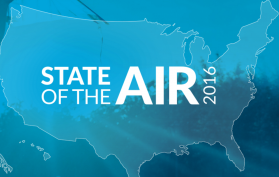 The American Lung Association’s 2016 State of the Air report ranked St. Louis as the 18th most polluted metropolitan area in the nation for ozone pollution, once again confirming what a critical concern air pollution continues to be locally. And those concerns have the potential to ramp up in the coming months, as the St. Louis area settles into its first summer season featuring stricter ozone standards.
The American Lung Association’s 2016 State of the Air report ranked St. Louis as the 18th most polluted metropolitan area in the nation for ozone pollution, once again confirming what a critical concern air pollution continues to be locally. And those concerns have the potential to ramp up in the coming months, as the St. Louis area settles into its first summer season featuring stricter ozone standards.
Last October, in an effort to further protect public health, the Environmental Protection Agency strengthened the National Ambient Air Quality Standards for ground-level ozone to 70 parts per billion (ppb), down from 75 ppb. With these standards now in effect, the area has the potential to see many more orange and red poor air quality days this summer.
Luckily, there are a number of steps all of us can take to help reduce emissions, and keep air quality in the healthy range.
Since transportation has the most profound impact on air quality, making the choice to spend less time behind the wheel is an easy way to reduce the emissions that lead to poor air quality. Actions like using transit, carpooling and vanpooling, choosing not to idle your vehicle, combining errands into a single trip, walking and biking more, telecommuting and/or adjusting work hours to stay off the road during peak commute times all help take cars off area roads and the related emissions out of our air. These actions are especially critical when poor air quality conditions are in the forecast. In addition, there are many eco-friendly lifestyle changes that can further positively impact air quality, including efforts to conserve energy, recycle, reduce waste and reuse items.
Throughout the summer, area residents can view the daily air quality forecast on our homepage. Visitors can also sign up there to receive the daily forecast via email. The forecast can also be found on our Facebook page and on Twitter @gatewaycleanair.
